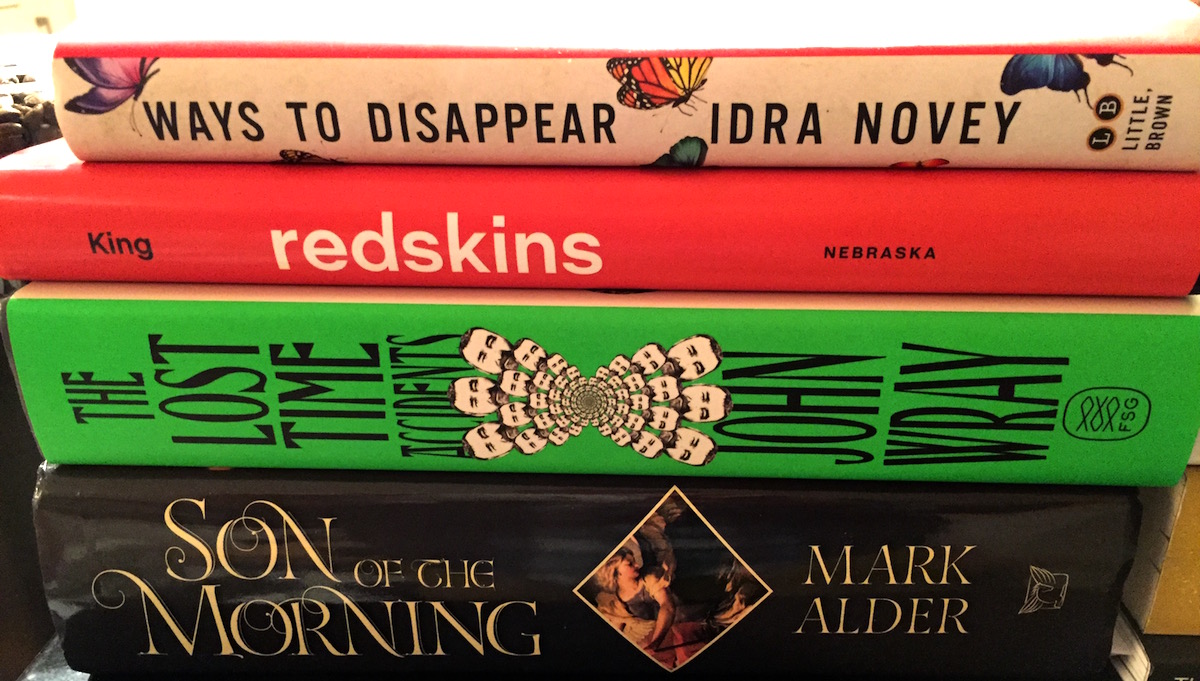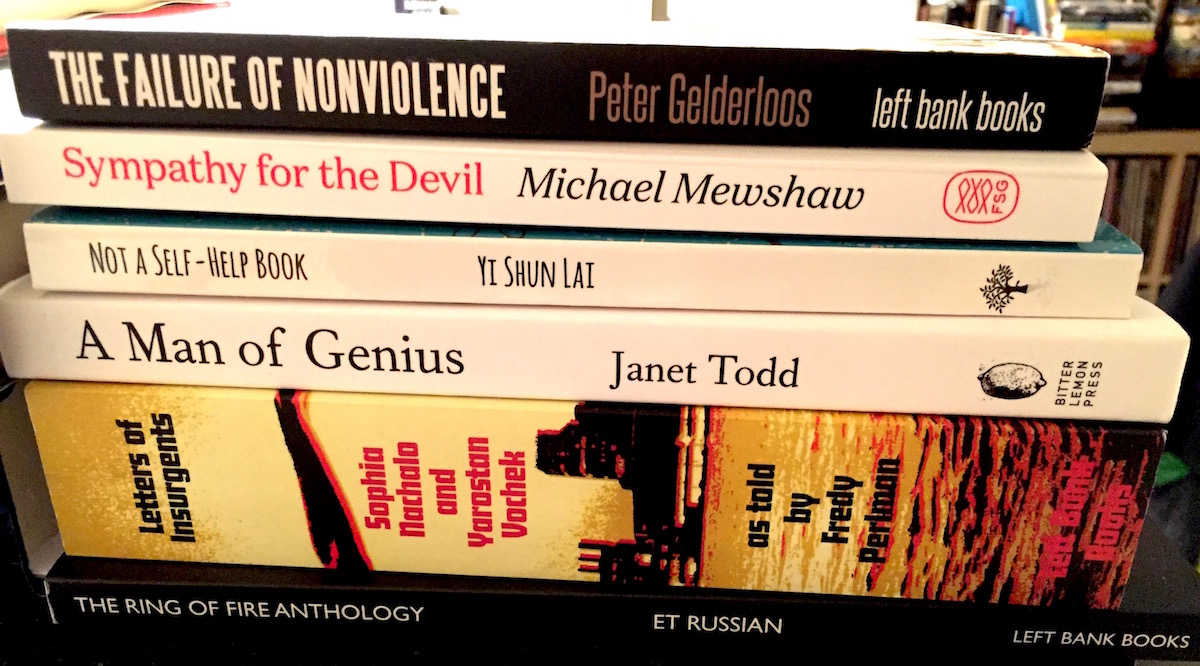Collage and poetry together
The wonderful Entre Ríos Books is back as a sponsor, with their stunning book Twelve Saints. The work combines poems about twelve saints with collages built from tintype photographs. The effect is somehow both ethereal and concrete, and aesthetically it is absolutely gorgeous. We have a sample spread on our sponsor's page. The book is reasonably priced, for such a beautiful work, and available at many locations in town, as well as on the Entre Ríos website.
Entre Ríos took advantage of our sponsorship program — new dates are now available through the Summer. If you're a small publisher, writer, poet, or foundation that is looking to back our work, and advertise your own in an inexpensive and expressive way, take a look at our open dates. Don't wait too long — we sold our last six month block out!
This weekend, G. Willow Wilson took a public stand against Marvel president Ike Perlmutter for donating $1 million to Donald Trump's weird pro-veteran charity thing. In her post on the controversy, Wilson made a joke about getting fired.
The next day, Wilson picked up an honor that definitely makes the case for her continued employment. Her Ms. Marvel comic won the Best Series award at the Angouleme International Comics Festival. It's the first Marvel comic to ever win the award. This is not the best year for the Angouleme — they're having a sexism problem — but they certainly made the right call with Ms. Marvel. Congratulations to Wilson, who certainly had a roller coaster of a weekend.
Your Week in Readings: The best literary events from February 1st-7th
MONDAY Let’s start our week off with one of the last Works in Progress open mic nights at the Hugo House in its current location. Works in Progress has been going on for years now, and it will undoubtedly stick with Hugo House in their temporary location on First Hill, but there is a certain kind of magic to the Hugo House cabaret space right now, as awkward as it can be when there’s a full house. There have been a lot of readers on this stage, and this is one of your last chances to get up there and give it a shot. Why not?
TUESDAY It’s time for Salon of Shame at the Cornish Playhouse in Seattle Center. The Salon, in case you didn’t know, is an ongoing reading series where people read their awkward teenage writing aloud. It’s cringe-y and funny and kind of empowering, in that it reminds you that you have evolved beyond your teenage self, even if you essentially feel the same inside.
WEDNESDAY This is the big event of the week: Eli Sanders and Jennifer Hopper appear in conversation with with Marcie Sillman at Town Hall. Sanders’s long-awaited book about the South Park home invasion case, While the City Slept, is finally published on Tuesday of this week, and this is an event to commemorate the book’s release. We’ll have more to say about this book in the next few days, but you should absolutely read it. It’s beautiful and sad and a brilliant piece of journalism.
Across town, I’ll be at the taping of Civic Cocktail, which is a local-interest TV show hosted by Joni Balter. Steve Scher and I will be interviewing local treasure Nancy Pearl. Four of Seattle’s city councilmembers will be there, too, to discuss the new woman-majority council. You can register for that here.

FRIDAY Elliott Bay Book Company hosts Anastacia Tolbert, who will be reading with Storme Webber and a touring program of Cave Canem fellows including Kamilah Aishah Moon and Librecht Baker. Cave Canem, if you didn’t know, is an organization that promotes and cultivates the work and careers of African-American poets. Every time they come to town, they blow audiences away.
SATURDAY Write Here Write Now happens at Fremont Abbey today. This one is for the authors: press materials promise a “one-day writing intensive like any other,” with an array of “mini-lessons, 1-on-1 author consultations, and lots of writing time with fellow writers.” This year’s keynote will be delivered by novelist Nancy Horan.
SUNDAY Seattle historian Paul Dorpat will discuss the life and legacy of Seattle restaurateur and personality Ivar Haglund at the West Seattle branch of Seattle Public Library. Dorpat has some rare photographs of Haglund and will talk about the clam guy’s West Seattle roots.
The Sunday Post for January 31, 2016
Maximum Wage: Is technological progress dependent on extreme inequality?
I've read many responses to Paul Graham's overly simple Economic Inequality essay. The best, I think, is this by Steven Johnson. Not only is he of tech culture, but he's willing to call out the things that are bad, as well as good. And he has an eye on a great truth of SF culture: it's not all money-grubbing venture capital bros. A lot of hard working, progressive people, willing to experiment with the foundations of their lives, are what makes the place tick.
When I first read “On Inequality” a few weeks ago, I found myself irritated by the hint of extortion in the way Graham phrased his argument: That’s a nice 50,000-year-curve of technological progress you got there; would be a shame if something happened to it. But the more I thought about it, the more I found myself considering all the forces that Graham left out of his startup-centric account of technological progress. Yes, hailing an Uber with your smartphone relies on innovations that made a small group of startup founders extremely wealthy. But think of all the other innovations that also make that experience possible, and the different economic models behind them. The Android operating system is a fork of the open-source operating system Linux, which was collectively authored by thousands of people all over the world, with no traditional ownership model for their creation. An iPhone contains many lines of code taken from open source platforms maintained by nonprofit working groups. The Web and TCP/IP protocols that allow the device to communicate with servers at Uber were developed by Tim Berners-Lee at CERN and by a handful of computer scientists around the world, many of them partially funded by the United States government. The network of GPS satellites that allow you to pinpoint your location on a map were initially created by the U.S. military. The atomic clocks that make GPS work were first built by national laboratories in the United States and the United Kingdom. Cellular networks were originally invented at Bell Labs, a research lab inside a giant corporation, whose innovations were effectively socialized thanks to the anti-trust agreement Bell, and then AT&T, struck to preserve its monopoly.
Molly for President, 2048
Look at this great, long piece about a neat local teenager with great ambition. Go Molly — You have the support of the Seattle Review of Books.
She became more drawn to the people doing the doing. The concept of “making change” stuck with her like leftover glue between her fingers, until it became clearer to the fourth-grader: politics.
“If I like politics so much, and if I just want to talk about politics all the time, why don’t I just be a politician? And so then of course my mind went straight to, Oh, I’ll just be the president.”
Molly’s held on to the idea ever since — except for a brief moment in middle school when she thought she should have a more realistic goal and decided she wanted to be a lawyer. “But now I’m kind of like, I’m just gonna shoot for the stars.” Her election year will “most likely be in 2048,” she says, when she’s “old enough to have experience but young enough to seem fresh.”
Why the British Tell Better Children’s Stories
Are you really going to let this assertion stand, American writers? Vollying creative work back and forth between the states and the UK is an old tradition. It's time for us to have an American invasion of great children's work.
That said, this is a good point….
American fantasies differ in another way: They usually end with a moral lesson learned—such as, surprisingly, in the zany works by Dr. Seuss who has Horton the elephant intoning: “A person’s a person no matter how small,” and, “I meant what I said, and I said what I meant. An elephant’s faithful one hundred percent.” Even The Cat in the Hat restores order from chaos just before mother gets home. In Oz, Dorothy’s Technicolor quest ends with the realization: “There’s no place like home.” And Max in Where the Wild Things Are atones for the “wild rumpus” of his temper tantrum by calming down and sailing home.
Nerdsmith: Adriana Lopez interviews Junot Diaz
Wide ranging inteview with the always interesting Junot Diaz:
I was living in Mexico City, I had a group of dudes and young sisters who liked to get together—we liked to go dancing, we liked to go drinking. One night I was out very late, this was like five months, no, maybe like four months into my trip. It was very late, and we were over at a friend’s house; the guy’s house who I was at turned out to—in the future—turned out to be a very famous Mexican actor. But that night we were just all hanging out and it was a bunch of Mexican bohemians and me and my Guatemalan buddy. And one of these Mexican cats just pulled a book off a shelf and just cornered me and was like, “My favorite writer in the world.” He was telling me, “My favorite writer in the world is Oscar Wao, I love Oscar Wao, Oscar Wao is brilliant.” And I was dying because I knew he meant Oscar Wilde. That’s where the book began. After that party I went home and I laid in bed, and I suddenly had this idea of this fore-cursed family. This idea of this awkward fat boy and this idea that this family would be cursed in love, that they would have great trouble finding love. You know it just felt like a real good kind of novella, telenovela type plot. I just thought, “Hey, I can work with this, you know, I can really change this into something else.”
PEN America presents Passages - Kickstarter Fund Project #4
Every week, the Seattle Review of Books backs a Kickstarter, and writes up why we picked that particular project. Read more about the project here. Suggest a project by writing to kickstarter at this domain, or by using our contact form.
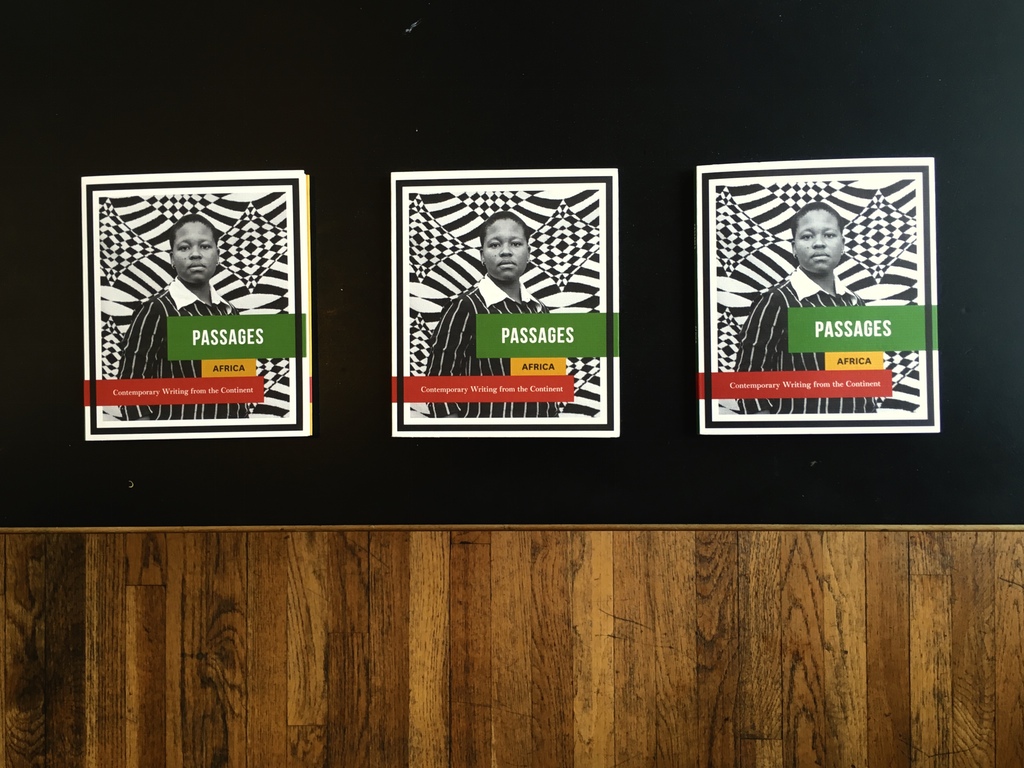
What's the project this week?
PEN America presents Passages. We've put $20 in as a non-reward backer
Who is the Creator?
What do they have to say about the project?
A new literary translation series featuring contemporary voices from around the world.
What caught your eye?
PEN American Center is a longstanding (since 1922!) org working to advance literature and defend free expression. Since 2005, they've been hosting the PEN World Voices Festival of International Literature.
According to them, in the US only 3% of books published are works in translation, and only nine languages account for 90% of the world's translations. They're doing work to make sure international arts are represented.
Passages will be a literary journal where each issue features a different region in translation. They've aready produced Africa, and Brazil and Mainland China are next.
Why should I back it?
Books are the greatest machines of empathy in the world. If you're feeling like your literature is staid, or you're tired of reading the same sorts of stories each week, or seeing the same sorts of covers coming out of the New York publishing houses, get a different perspective by backing this.
Scroll waaaaaaay down past all the 1-backer options (which are a little silly, but Kickstarter doesn't allow you to alter your pledges after they are backed) and get to that little gem of reward: $35 for all three issues mentioned above. That's where you want to be.
How's the project doing?
At 20 days to go, they're 90% funded, so looks like they'll make it. But still, throw your money in. This is a fine deal for a nice set and a good cause. They'll look handsome on your shelf.
Do they have a video?
Kickstarter Fund Stats
- Projects backed: 4
- Funds pledged: $80
- Funds collected: $20
- Unsuccessful pledges: 0
- Fund balance: $960
G. Willow Wilson on commercial art, ethics, and Donald Trump
Earlier today, the comics world responded to the news that Marvel president Ike Perlmutter donated one million dollars to Donald Trump's veteran event. Of course, if this were a simple donation to a nonprofit veteran association it would be a nonstory, but the fact that Perlmutter donated it to Trump's event made the donation much more morally sticky. The money did not go, as Trump claimed, directly to veteran's needs; it was donated to "The Donald Trump Foundation." The fact is, donating a million dollars to Donald Trump for any purpose is an ostentatious political statement, but donating a million dollars to the event Donald Trump hosted in lieu of attending the final Republican debate before the Iowa caucuses is tantamount to tattooing a "Trump for President 2016" banner across your forehead.
All day, comics creators who work for Marvel have been fielding questions about this on social media. Michael Moore publicly suggested that he might reconsider before buying tickets for the next Marvel movie. Boycott threats abounded.
Tonight, though, Seattle writer G. Willow Wilson, who writes the popular Ms. Marvel comic for Marvel, posted a thoughtful essay on her Tumblr about the situation. Wilson, who converted to Islam about fifteen years ago, takes the news personally. She writes, "The irony that Ms Marvel was launched on Perlmutter’s watch–while Donald Trump would like to prevent Muslims from even entering the United States–was not lost on the mainstream media, nor on me."
Wilson explains that a boycott will not hurt Perlmutter's finances in the least, but it will likely get a lot of comics written and illustrated by innocent (Trump-loathing) Marvel creators canceled. On the other hand, she observes, boycotts are pretty much the only way that people can make their voices heard in modern-day America. This is, she says...
...the great catch-22 of corporate art in any form. ( And it’s something I think about a lot.) It’s the flaw inherent in the system. There’s a lot I can’t say, so let me just say this: follow your conscience. I am going to continue to work on Ms Marvel, for the following reason: I have never, in my entire career, seen a character and a story light people up the way this has, and I need to see it through a little longer. (Unless of course I get fired for talking about this shit, in which case, it was nice meeting you all.)
Wilson then suggests that her readers donate to a (Trump-free) veteran's association in response to this news. You should read her whole response. It's a classy, thoughtful, compassionate piece of writing that really wrestles with the issue on a genuine level. And on a professional level, this is a brave essay for Wilson to write. Her work with Marvel has propelled her to a whole new level of stardom, and there aren't that many outlets for professional comics writers these days.
As a fan of Ms. Marvel, I must admit that the words "I need to see it through a little longer" fill me with dread. Ms. Marvel is one of the only Marvel series I follow closely because it's the most Marvel-y book that Marvel publishes right now — weird, soap-operatic, and a lot of fun. If Wilson quits writing it, I can't imagine the character will survive.
But the good news is that Wilson has acquired a fan base that will read her work wherever it appears; I'd love to see her and Ms. Marvel artist Adrian Alphona do a twist on their mainstream work at Image Comics. That way, they'd entirely own the rights to the work they publish, and they'd be from any association with the stench of Trump's hate-mongering. Wilson should know right now that her fans will follow her anywhere, no matter what happens. She's more than earned our respect.
The Help Desk: Is it even possible to read while high?
Every Friday, Cienna Madrid offers solutions to life’s most vexing literary problems. Do you need a book recommendation to send your worst cousin on her birthday? Is it okay to read erotica on public transit? Cienna can help. Send your questions to advice@seattlereviewofbooks.com.
Dear Cienna,
I love to read. I love to smoke pot. I can't smoke pot and read. I can get high and watch movies, but words on a page get all swimmy when I've had even just a single puff. But I have friends who love to smoke and read, and they make me so jealous when they talk about sitting down for a night with a book and a joint and reading two or three hundred pages at a go. Can I make my dream a reality, or is my own brain chemistry working against me?
Jean in Shoreline
Dear Jean,
I find your friends' claims of reading (let alone retaining) hundreds of pages of text while high incredibly suspect, perhaps because I have trouble with basic tasks while high, like peeling fruit, blinking, and telephones. What in the Oxford-loving fuck are your friends reading and how could it possibly be more fun than rubbing your belly and chanting the word "velocity" under your breath in a dark closet?
To your question: Instead of reading books, give graphic novels a try. Ignore what little text there is and focus on the beautiful illustrations. I'd start with Black Hole and Bottomless Belly Button – both of which, if memory serves, are pretty light on text. Another option is to pick up Weathercraft or Congress of the Animals by local genius Jim Woodring. Most of his books are wordless, beautiful and weird.
Kisses,
Cienna
Book News Roundup: A book fair for Scarecrow and a poster for Bowie
- Scarecrow Video, the best damn video store in the whole damn world, announced yesterday that they're running a fundraiser book fair through the Northgate Barnes & Noble. Between February 20th and February 27th, a portion of the sales from every customer who presents code 11800976 when they buy books in store or online will be donated to Scarecrow. To celebrate the book fair, I'm giving a talk about books and adaptations titled "The Book Was Better but the Movie Was Shorter" on Saturday, February 20 at 1 pm. It's free. You should come. Scarecrow also made ths gorgeous poster to celebrate:
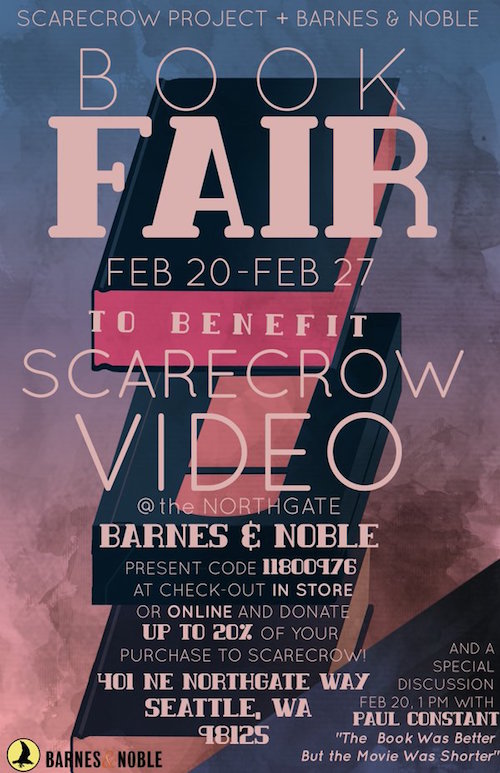
The New York Times has sued Powerhouse Books over the use of New York Times cover images in David Shields' most recent book, War Is Beautiful. Many are questioning the wisdom of the Times's suit; for more information, read this report by Jeff John Roberts at Fortune.
The American Library Association has gone back to print on the wonderful David Bowie READ poster, which features Bowie, barefoot and dressed like a teenager, leaping into the air while reading The Brothers Karamazov. The poster costs $18 and will be shipped in early February, making it an ideal Valentine's Day gift.
This page from Octavia Butler's notebook made the rounds on Twitter yesterday, and it is incredible:
Octavia Butler's notebook.
"So be it. See to it." pic.twitter.com/LJXQEW64uQ
— TyreeBP (@TyreeBP) January 28, 2016Portrait Gallery: Nichelle Nichols
Each week, Christine Marie Larsen creates a portrait of a new author for us. Have any favorites you’d love to see immortalized? Let us know
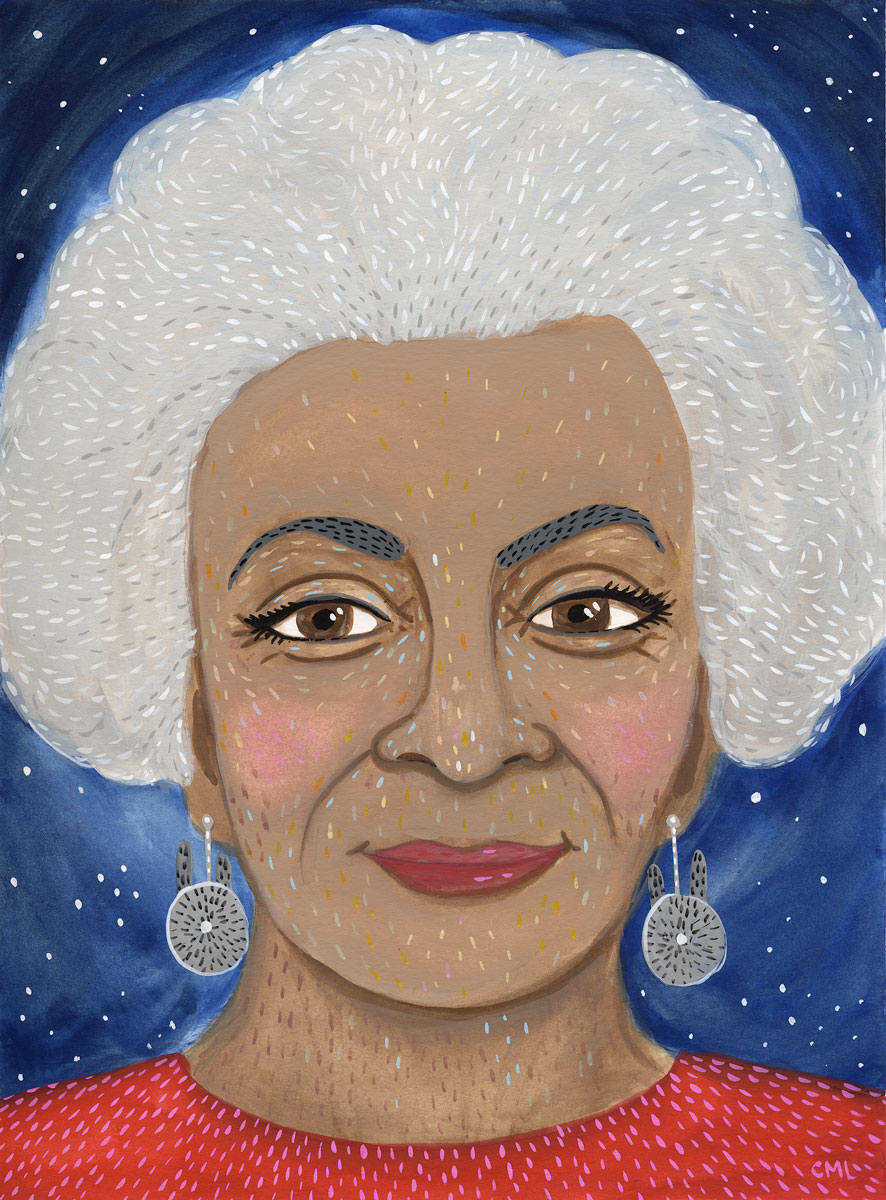
A subject who needs no introduction, and whose name is widely known. Nichols, of course, played Nyota Uhura in the original Star Trek series and movies. She was going to leave the role after the first season, but at a NAACP fundraiser, she met fan of the show who convinced her to stay on:
I looked across the way and there was the face of Dr. Martin Luther King smiling at me and walking toward me. And he started laughing. By the time he reached me, he said, yes, Ms. Nichols, I am your greatest fan. I am that Trekkie.
And I was speechless. He complimented me on the manner in which I'd created the character. I thanked him, and I think I said something like, Dr. King, I wish I could be out there marching with you. He said, no, no, no. No, you don't understand. We don't need you on the - to march. You are marching. You are reflecting what we are fighting for. So, I said to him, thank you so much. And I'm going to miss my co-stars.
And his face got very, very serious. And he said, what are you talking about? And I said, well, I told Gene just yesterday that I'm going to leave the show after the first year because I've been offered — and he stopped me and said: You cannot do that. And I was stunned. He said, don't you understand what this man has achieved? For the first time, we are being seen the world over as we should be seen. He says, do you understand that this is the only show that my wife Coretta and I will allow our little children to stay up and watch. I was speechless.
On Sunday, join the downtown branch of the Seattle Public Library for the "Star Trek Geek Out". Costumes are encouraged.
A rainbow of grief
Published January 28, 2016, at 11:54am
Cartoonist Tom Hart's daughter died in her sleep for no apparent reason just shy of her second birthday. How do you find the words for that kind of a loss? You don't.
Thursday Comics Hangover: To be young and sad
Local cartoonist Elk Paauw’s minicomic It’s Okay to Be Sad Sometimes is a collection of short comics about sadness. Are all the sadnesses linked to a single cause? Maybe; it’s not entirely clear, though Paauw does allude to a breakup several times. In any case, the book works as a narrative about a single depression or as a thematic collection.
In the first couple pages, Paauw draws themself crying on a train; Paauw’s eyes are big, doe-y bubbles with leaking reservoirs of tears just underneath. A woman on the train turns to Paauw, who angrily replies, “Yes. I’m crying. Move on.” That’s the whole strip, and it seems to be a real you-get-it-or-you-don’t kind of an affair. Either you’ve been sad in public and can relate, or you haven’t and you don’t.
Recognition is key to the appreciation of Sad. The comics in the first half are all about being sad in various situations — buying ice cream, attending a party, riding transit — and the comics in the second half are about what happens when you try to climb out of it. (Will sex help? Is it even possible to find someone to have sex with? How does anyone successfully manage to have sex?) Most of the comics are just a few panels long, and the book feels slight, like a rough draft of something bigger (though for $5, you probably shouldn’t go in with expectations for a dense narrative in the first place.)
Paauw is a gifted young cartoonist. They use dense, almost Sharpie-like lines in their art, but the amount of expressiveness they draw from those lines is surprising. The manga-by-way-of-Scott-Pilgrim influences are clear, but not oppressive; unlike the exaggeration of the comics that influence Paauw’s art, these comics are strictly grounded in realism. You’ve made these faces, worn clothes that hang like this, hugged your mother and cried this way.
Sad is obviously a work by someone who’s just getting started as a cartoonist. You won’t find the shorthand and nuance of, say, a Peter Bagge comic here. But if your cartooning tastes veer more toward the punky end of the spectrum — those works of art that are all about truth and attitude and feelings — you’ll find a lot to like here. It’s a story of figuring it all out, written by someone who is standing on the crossroads, trying to decide what to do next. Whatever “next” entails for Paauw, hopefully they’ll keep making comics.
Book News Roundup: The diversity in publishing edition
The fourth issue of online literary magazine Moss is available for you to read. Contents include an interview with Elissa Washuta and a long short story by Seattle Times book critic Michael Upchurch. It's free. Go read.
Congratulations are due to Bellingham's wonderful Village Books, which has been shortlisted for Publishers Weekly's Bookstore of the Year Award. The winner will be announced in late March.
You should read this Shelf Awareness report on the results of a study of Amazon's economic impact:
In 2014, Amazon's warehouses--65 million square feet of space--employed roughly 30,000 full-time workers and 104,000 part-time and seasonal workers. But including all the jobs lost from stores whose sales Amazon supplanted, Amazon sales "produced a net loss of 135,973 retail jobs."
Matt Cunningham of Civic Economics noted, too, that in 2014 Amazon book sales were about $5.618 billion, some 11.6% of Amazon retail sales. That amount of sales represents about 3,600 "bookshop equivalents and 40,000 bookstore employees," which he called "a sobering statistic."
The results of the Diversity Baseline Survey, investigating diversity in publishing, has been released. You should go read all the results, but in short the publishing industry is overwhelmingly straight, white, and female, though predictably the executive level is much closer to an even male-female split.
With that in mind, please enjoy this story about a girl who was "sick of reading about white boys and dogs" and so started the #1000BlackGirlBooks hashtag.
Scientists have named a new type of leech after author Amy Tan. When she heard of the honor, Tan was delighted.
Body of work
Published January 27, 2016, at 11:57am
Is pregnancy inherently heteronormative? Can writers like Maggie Nelson and Jen Graves help us push through some of our assumptions about gender and motherhood and art?
Browsing the shelves at Push/Pull
If you browse the comics section at Push/Pull, you might find a Post-It note affixed to the front of a minicomic here or there. These are the local equivalent of staff recommendation tags, only all the Post-Its are written by owner Maxx Follis’s son, and they are completely adorable. One Post-It on a book called The Age reads “It has amazing twist. —Sean.” A recommendation stuck to another book, I Think Our Friend Dan Might Be a Dolphin, by James Stanton, says “Funniest commic of 2015 — Sean, 8.” (The 5 on 2015, best of all, is backwards.)
Sean is on the right track: I Think Our Friend Dan Might Be a Dolphin is pretty goddamned funny. It’s narrated by someone who is just starting to recognize the warning signs about his friend Dan: “I first noticed the blowhole stains when I ran into him at Hot-Wing City last Friday.” It goes on like that, getting weirder and weirder along the way until you turn to a shot of Dan, drawn in Stanton’s impeccably cartoonish linework, with each of his tail fins crammed inside a gaudy running shoe. If you’re not amused, you’re probably a little bit dead inside.
Another funny comic at Push/Pull: How Baseball Works, by B. Lehmann. In it, the players try to explain the rules of baseball to the readers in as simple language as possible. A pitcher looks at us on the first page, explaining that “I’m gonna throw this ball real fast and my intention is that the batter tries to, but doesn’t hit it, three times and he’s out.” The first base coach adds, “I’m gonna tug my ear and then make tootley dootley hand signals.” It goes on from there.
Not all of the books are funny. Push/Pull founding member Seth Goodkind’s Predators and Prophets: A Comic History of Pacific Northwest Cults collects short strips identifying some of the highest-profile cults from the region. Illustrated in Goodkind’s dense, inky, hyperrealistic style, these profiles of Rancho Rajneesh, the Love Israel Family, and the Indian Shaker Church are a little bit creepy and entirely fascinating. It’s the kind of book that makes you wonder: are colorful cults weirdly specific to this part of the world, like serial killers? Or is Goodkind just really good at research?
Some of the comics veer more toward good old-fashioned zine territory, as with Bunny Lee’s Confusing Costume: Liberated Fashion Zine. On colorful pages packed with handwritten prose, Lee describes how “Life was vexing before I learned how to speak through fashion.” To her, fashion is bright and colorful and expressive — though she’s bothered when people say that she dresses like a child. Later, she urges her readers to remember that they’re “morally compelled to be confusing,” to challenge the “assumptions others may make about you.” It’s a bright and energetic encomium to individual style, and it comes with a mix CD featuring songs like “Vogue” and “The Humpty Dance” and Rufus Wainwright’s “Puttin’ on the Ritz.” You can’t read it without feeling waves of gratitude that people are still sending messages like these out on the rafts of Push/Pull’s shelves.
These are not mass-market stories; the books that Push/Pull carry often have print runs in the three or even two digits. They’re tiny, personal monuments to a moment in time, a wall full of love letters just waiting to jump into your arms and go home with you.
Previously, in our Booktore of the Month series:
Push/Pull is our January Bookstore of the Month
Push/Pull gives a home to artists who feel underrepresented.
In defense of italics
I first encountered this tweet while I was reading Johanna Sinisalo's wonderful The Core of the Sun:
Has anyone ever opened a novel and said "Oh good, a long passage in italics"
— Elisa Gabbert (@egabbert) January 1, 2016And while I guess I've never opened up a novel and been excited about the presence of italics, I've certainly never been disappointed to see italics, either. The Core of the Sun features quite a few passages in italics — the book is made up of a collage of letters and dictionary entries and other odds and ends — and it works really well; the italics signify difference in a visual shorthand that's not quite as jarring as, say, switching to a different font.
And when I see italics, I automatically read the passage differently than I would otherwise. I've never tried to put this into words before, but I guess to me, italicized passages read as tough they're spoken in a whisper. Those passages seem more reflective to me, a little more intimate; maybe this just stems from the way I lean forward to read italics a little bit more carefully than I do "normal" text.
Anyway, the tweet reminds me of a story from my bookselling days. A customer came to me looking for a recommendation. She wanted a family story set in small-town America, something funny and appealing and well-written. The novel that fit every aspect of her description had just come out in paperback, and so I handed it to her: Empire Falls, by Richard Russo.

"Italics," she said, by way of explanation. "I don't read italics."
It's true that Empire Falls opens (and closes) with a long passage in italics, but those passages make up something like one or two percent of the entire book. I suppose I felt a little annoyed at her for passing up a great novel for such a superficial reason, but mostly I felt bad for her. She was denying herself the reading experience that she most wanted and needed at that time in her life just because of a stylistic peccadillo. It's like meeting the love of your life and deciding you don't want anything to do with him because he's wearing a green t-shirt. What a waste.
Punk snot dead
Published January 26, 2016, at 12:00pm
What was it like in the Seattle punk scene in the early '80s? And why even look back? What's the difference between nostalgia and history? Andrew Hamlin looks at Desperate Times, a book about a magazine about a music town back when those in the town had to fight for every gig, and every scrap of recognition.
Inkwells
From the first day, the teacher wrote as she spoke. An inkwell was a hole
without words, on the desk, which was like a pasture, leaving me free to think.
I could not repair my cursive with my pen or with my breath on the window pane.
The inkwells were filled from a large bottle of ink kept in the teacher’s closet.
My mother was disgusted by the inkwells, and by how I was forbidden to write
a letter to a friend. Was I the only one who found inkwells in the picture book?
The older boys sanded wood into serpents with claws, and filled the inkwells.
To my surprise, the words were more brown than black in my notebook.
Birds are called quills, when used. I could see the globe and the squares of Palmer
Method, encircling the room like wallpaper. The rustlings under my pen traveled far,
the faintest murmur. The word “recess” was next. In his lunch pail, the boy beside me
discovered a meal of cold potatoes. I felt the embarrassment of hooking the lunch pail
through my fingers. Weird tether. To make a ball, each of us brought some string
from home. We tried to dip the string into our inkwells. The teacher called out
positions to get into, such as a hawk. I saw my score. Woebegone, so much to do.
I positioned myself like a startled hare. Our desks sloped, and there was a groove
for our pencils and pens. The serpent of our script crawled off the page.
Michael Schmeltzer's Elegy/Elk River
Our thanks to Floating Bridge Press for their sponsorship this week. They're showing off 2015 chapbook award winner Michael Schmeltzer, and his winning work Elegy/Elk River. The titular poem is available to read on our sponsors page, and it is an amazing piece of work. His accolades are well deserved.
The 2016 Chapbook Competition is now accepting entries. The winner will be joining an impressive line of poets going back twenty years. There's more information on the sponsor page, but if you're a poet looking for opportunities to submit your work, you should certainly pay attention here. You'd walk away with a cash prize, and publication of your chapbook. Be sure to check it out.
Also, big news! We've just opened up our Spring/Summer block of sponsorships, and we have some openings coming up as early as February. Book now to grab your spot, our last block of sponsorships sold out. We'd love to get your project, event, or publication in front of our readers. Reserve your spot now so that we can make that happen, or read more information about our sponsorship program.
